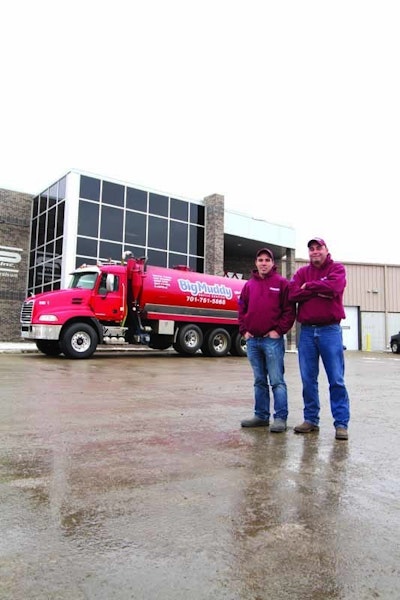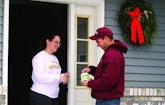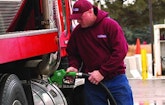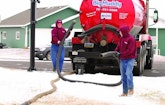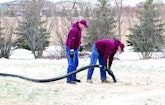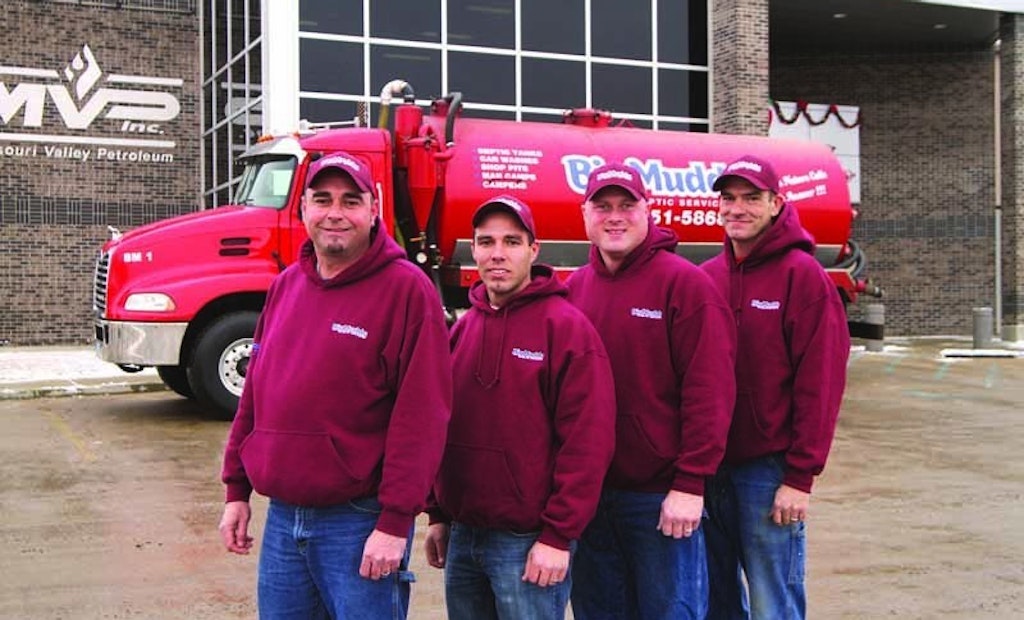
Interested in Trucks?
Get Trucks articles, news and videos right in your inbox! Sign up now.
Trucks + Get AlertsThe story behind Big Muddy Septic Service in Mandan, North Dakota, is similar to many new businesses. An entrepreneur sees a need and decides he can fill it, provide effective service and make a good living. But Big Muddy’s story is also about a little guy working with a big company in a win-win situation. And how one business leads to another and another, until customers have a one-stop shop for fuel, septic and grease trap service, and portable restrooms.
Kirt Pelster started Big Muddy just four years ago when he realized that he didn’t have to work in the nearby Bakken oilfield to benefit from it. Because of the draw of workers to the oil industry, there was a big demand for services in communities in central and southwestern North Dakota.
And it didn’t take Pelster long to figure out he could capitalize on his experience and opportunities within the company he worked for, Missouri Valley Petroleum (MVP).
CONNECTING THE DOTS
The business opportunity started like this: Pelster needed his home’s septic tank pumped, and it took several days before businesses he called got back to him. Something clicked in his brain. Most pumpers are owner/operator businesses and they were having a hard time keeping up with demand.
“I recognized there was a need for professional services – someone who would call people back,” he says.
Pelster was working for MVP, managing a propane division, and ran his business evenings and weekends. He learned as much about septic service as he could from a friend with a pumping business in western North Dakota and bought his first truck, a 1994 International.
Pelster picked up customers with cold calls and offered a coupon along with other businesses as part of a direct mailing that targeted local homeowners. For his next marketing promotion, Pelster approached his supervisor and one of the MVP owners, asking to insert an informational note and $25-off coupon with the 1,200 billing invoices MVP sends out every month.
“That gave customers faith in me because they knew and trusted MVP, which has been in business since 1946,” Pelster says.
Business boomed. Pelster was putting in 80-hour weeks between his job and his business. The long hours took a toll on his personal life. To find balance, he approached MVP Vice President Jim Froelich about partnering with MVP.
The pairing made sense. People who need propane bottles filled typically also have septic systems that need to be maintained. MVP has human resources and accounting staff to take care of office and paperwork.
“We approached it from the standpoint that MVP could offer the broader depth and management as well as the resources he needed to grow,” Froelich says.
“Once we joined with MVP (November 2013), the septic business went crazy,” Pelster says. A year later Big Muddy had 10 times the business it had after startup.
Mitch Bitz filled in the last connected service – portable sanitation – in 2013. He also had a relationship with MVP — the company had supplied fuel for his convenience store until he sold it. It wasn’t long after Bitz founded Mandan-based Spot-A-Pot that he approached MVP, and they agreed that Bitz’s portable sanitation service would fit in well with MVP’s diverse operation.
MVP was also looking to expand and was interested in forming a partnership; Pelster and Bitz each retain a portion of ownership of their respective businesses.
EQUIPMENT UPGRADES
As partners with a large operator, Pelster and Bitz have access to additional capital to add and upgrade their equipment.
Bitz owned a 2007 Ford F-450 with a 2012 Progress Tank slide-in unit with a 540-gallon waste/260-gallon freshwater aluminum tank and Conde pump (Westmoor Ltd.). With a liftgate, he could haul up to four portable restrooms as well. When he joined the partnership, Bitz had 60 PolyPortables Integra restrooms. Today he has 180 restrooms from
PolyPortables and two PolyPortables Tag-Along hand-wash stations. The company uses PolyPortables chemical products.
To service the expanding restroom inventory, the partners purchased a 2014 Ford F-550 four-wheel-drive truck with a 900-gallon waste/300-gallon freshwater aluminum tank and Masport pump built out by TankTec. In less than three months, the truck had 8,000 miles on it. Bitz’s old truck is used as backup.
The 1994 International truck Big Muddy brought into the partnership is also now a backup truck.
“We call her ‘Old Faithful’ because she has never let us down,” Pelster says, despite 795,000 miles on the odometer. But its 1,800-gallon steel tank isn’t as efficient for long hauls as the newer trucks with bigger tanks. A 2008 Mack has a 5,000-gallon Imperial Industries steel tank and Jurop/Chandler pump. It is the main truck for septic service and is also used for pumping at oilfield worker camps, RVs at campgrounds and grease traps.
A 2006 Sterling with a Keith Huber 3,300-gallon hazardous material tank has a full-opening rear door and a two-stage hoist. It works well for pumping car wash and shop pits.
Another equipment investment important for endurance in rugged North Dakota is the 100 percent rubber hose from VARCo that is on all the trucks, Pelster says. Also, the company markets Bio-Tab septic additive from Century Chemical Corp. to customers.
EMPLOYEE RELATIONS
Under the joint venture, Pelster and Bitz also gained help with the hiring of two employees. They receive the same health and retirement benefits as MVP’s 200 employees and participate in MVP’s monthly safety meetings.
The relationship with their two employees is good, Pelster says, because he and Bitz have both done the work, and still do it on occasion. “We’ve never asked them to do something we wouldn’t do ourselves,” Pelster says.
At the same time, the drivers are held to quality standards to act professionally and to spend time with customers and educate them about their septic systems. Drivers take care of the trucks as if they were their own. The men are cross-trained to pump tanks and take care of the portable restroom side of the business.
Employees also receive bonuses as an incentive for selling MVP services or products to new customers. Pelster manages Big Muddy along with his new role at MVP in sales, coordinating combination sales of all the company’s services.
“We can help new homeowners get a septic tank put in, provide temporary heat and portable restrooms during construction, and propane to heat the house,” Pelster says.
Bitz markets and coordinates the portable restroom side of the business, which is about 80 percent construction and 20 percent events.
MEETING CHALLENGES
Pelster anticipates Big Muddy will be running six trucks within a few years. Bitz expects Spot-A-Pot will grow to offer 500 restrooms and run six trucks with four or five employees. The projections are due to growth in the communities they serve and a couple small competitors having gone out of business.
“The health department is cracking down on land application with more regulations and paperwork, and it’s getting harder to be a one-person owner/operator,” Pelster says.
Big Muddy and Spot-A-Pot take septage and portable sanitation waste to the Bismarck waste treatment plant and do some work for the city. The pumpers have 24-hour access to the plant, and rates are reasonable compared to other areas. Pelster adds that Bismarck’s landfill accepts grease, which is about 25 percent of Big Muddy’s work.
Maintaining a good relationship with the city and taking care of customers is the first priority. Once that is in place, oilfields may be the next market. However, there are plenty of other opportunities for expansion with MVP’s diverse services.
To be more efficient, the septic pumping and portable restroom businesses are investing in RouteOptix software technology, which includes reading bar codes on portable restrooms, mapping routes and tracking employees and equipment.
CDL drivers are in short supply; many are oilfield contractors. The pumping contractors are looking for ways to work with non-CDL drivers. One way they’re doing that now is by purchasing a Ring-O-Matic vacuum trailer that can be pulled behind a pickup and transported by any technician with a driver’s license.
Regardless of where the future takes them, the entrepreneurs emphasize the importance of dependable service.
“The reason we have been so successful is that when we tell people what we are going to do, we do it,” Pelster says. “They know we will answer the phone 24/7.”
